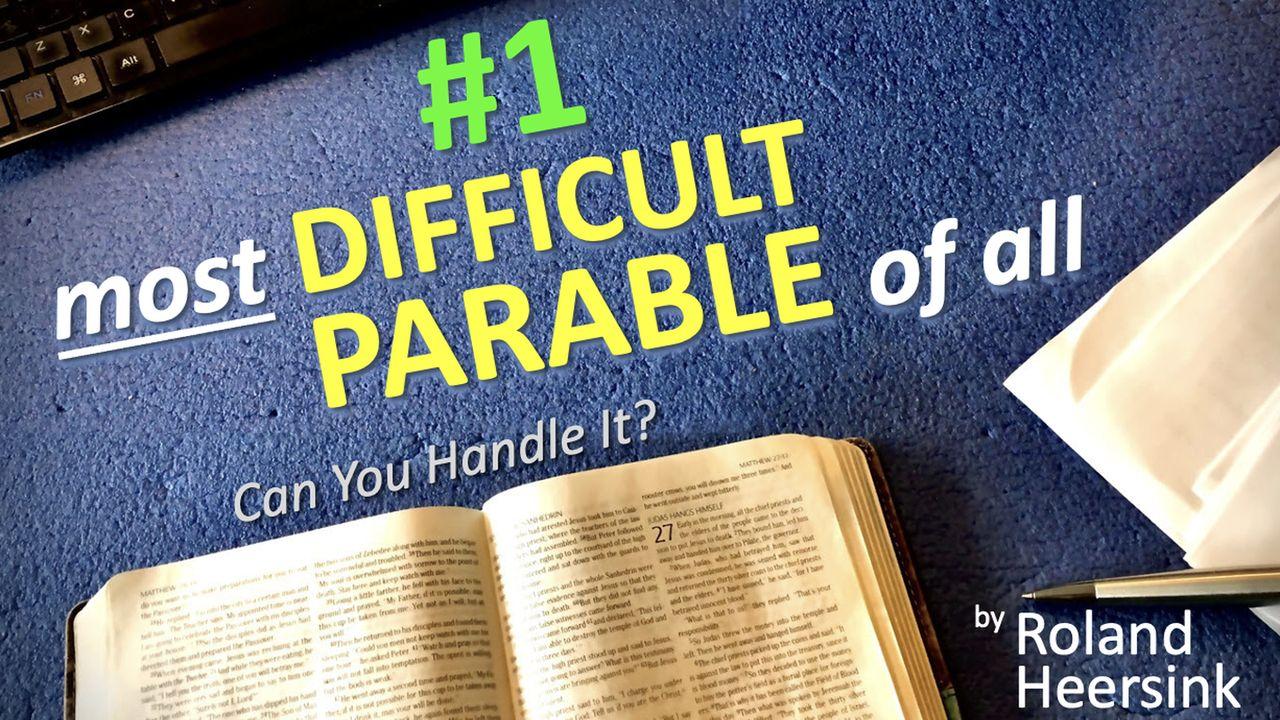#1 Most Difficult Parable of All – Can You Handle It?نموونە

One of the more interesting aspects of the New Testament are the parables of Jesus, as recorded in the gospels of Matthew, Mark & Luke (John didn’t record any parables).
Jesus often taught through the use of parables, because they were easy to understand and related to everyday life.
It was like he was saying, "Hey, here's a story about life that actually has a deeper meaning about how we should live our lives and relate to God."
This was an easy way to get people thinking and maybe even changing their ways without being too preachy.
Talking about his use of parables, Jesus basically says, "I tell stories because some folks just don't get it, even when they're looking right at it or hearing it loud and clear." Check his exact words:
This is why I speak to them in parables:“Though seeing, they do not see;though hearing, they do not hear or understand.– Matthew 13:13
Jesus used parables to separate those who really wanted to understand from others who just weren't interested.
He wanted people to really think about what he was saying and be open to the deeper meanings behind his words. And in doing so, he fulfilled a prophecy by the prophet Isaiah as recorded in Isaiah 6:9-10.
So how many parables did Jesus tell?
People disagree on the exact count, since Jesus sometimes explicitly called something a parable; at other times, he simply shared a story without calling it a parable. Some parables were long stories, others were just a simple sentence or two.
Can you name 5 parables of Jesus?
Do you have a favorite?
Look up a parable or two from the list below and read it, just for pleasure.
· The Two Builders (Matthew 7:24–27; Luke 6:46–49)
· The Sprouting Seed (Mark 4:26–29)
· The Children of the Marketplace (Matthew 11:16–19; Luke 7:31–32)
· The Unclean Spirit (Matthew 12:43–45; Luke 11:24–26)
· Tree and Its Fruit (Matthew 12:33–37; Luke 6:43–45)
· The Strongman’s House (Matthew 12:29–30; Luke 11:21–23)
· The Sower and the Seed (Matthew 13:3–9; Mark 4:1–9; Luke 8:4–8)
· The Wheat and the Tares (Matthew 13:24–30)
· The Mustard Seed (Matthew 13:31–32; Mark 4:30–32; Luke 13:18–20)
· Leaven in the Dough (Matthew 13:33; Luke 13:20–21)
· The Hidden Treasure (Matthew 13:44)
· The Pearl of Great Price (Matthew 13:45–46)
· The Dragnet (Matthew 13:47–50)
· Treasures New and Old (Matthew 13:52 )
· The Moneylender (Luke 7:41–43)
· The Good Samaritan (Luke 10:25–42)
· The Friend in Need (Luke 11:5–8)
· The Rich Fool (Luke 12:15–21)
· The Master’s Return (Luke 12:35–40)
· The Unfruitful Fig Tree (Luke 13:6–9)
· The Great Banquet (Luke 14:15–24)
· The Lost Sheep (Matthew 18:12–14; Luke 15:3–7)
· The Unmerciful Servant (Matthew 18:23–34)
· The Lost Coin (Luke 15:8–10)
· The Prodigal Son (Luke 15:11–32)
· The Dishonest Steward (Luke 16:1–8)
· The Rich Man and Lazarus (Luke 16:19–31)
· The Master and His Servant (Luke 17:7–10)
· The Widow and the Unjust Judge (Luke 18:1–8)
· The Laborers in the Vineyard (Matthew 20:1–16)
· The Wicked Vine Dressers
(Matthew 21:33–46; Mark 12:1–12; Luke 20:9–19)
· The Two Sons (Matthew 21:28–31)
· The Wedding Banquet (Matthew 22:1–14)
· Faithful vs. Wicked Servants
(Matthew 24:45–51; Mark 13:32–37; Luke 12:41–48)
· The Wise and Foolish Virgins (Matthew 25:1–13)
· The Three Servants and the Talents (Matthew 25:14–30)
· The Ten Minas (Luke 19:12–27)
· The Sheep and the Goats (Matthew 25:31–46)
کتێبی پیرۆز
دەربارەی ئەم پلانە

Jesus used parables to teach others, and these still speak to us today. Many parables are well known; others less so. Some bring comfort; others correction. Some are easy; others difficult. Of all parables, we hear a take-away message that sounds right & fine, but may miss the key point – likely because that teaching is so difficult. In this devotional, we take a closer look at this most difficult parable.
More
پلانە پەیوەستەکان

Everyone Should Know - Thanksgiving Special

OVERCOME Lust WITH TRUST

The Mandate to Multiply.

When Heaven Touched Earth - a 7 Day Journey to Christmas

Scriptures and Hymns to Grow Your Joy This Christmas

Adversity

Your Prayer Has Been Heard: How God Meets Us in Seasons of Weariness and Waiting

Lessons From Some Hidden Heroes in the Bible

What the Bible Says About Advent - 29 Days of Advent Meditations
